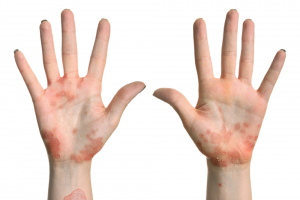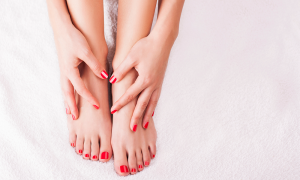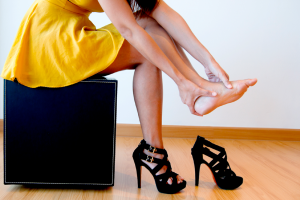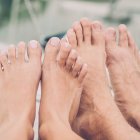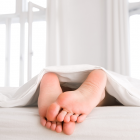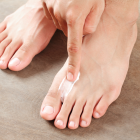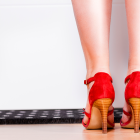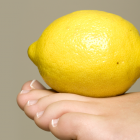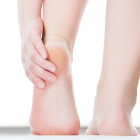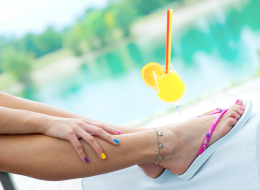Stress Test 7 Stress Symptoms That Appear On Your Feet
Symptoms of stress show themselves in countless ways, and several actually have the power to affect the health and look of your feet. Find out if you’re stressed with our Footfiles Stress Test.
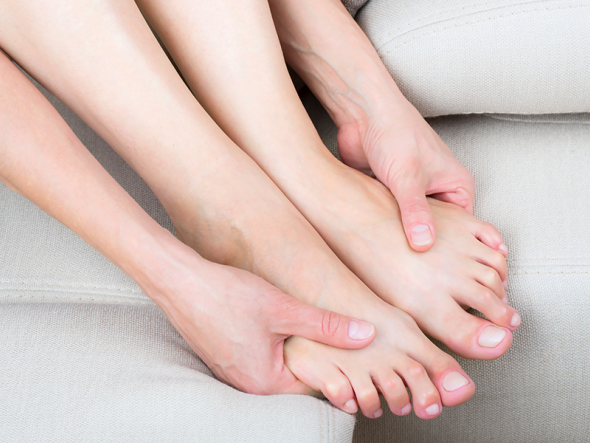
Stress is a nasty reality that plagues us all, especially in today’s fast-paced and hectic world. We all suffer from stress to some degree or another, but how do you know if your stress levels are too high? Believe it or not, your feet have the ability to show symptoms of stress and reveal whether or not it’s time you take a chill pill and find some stress relief.
Stress Symptoms Of The Feet Included In This Gallery: Dry skin, eczema and psoriasis breakouts, sweaty feet, cold feet, Beau's lines, redness, swelling, numbness and tingling.
![]()
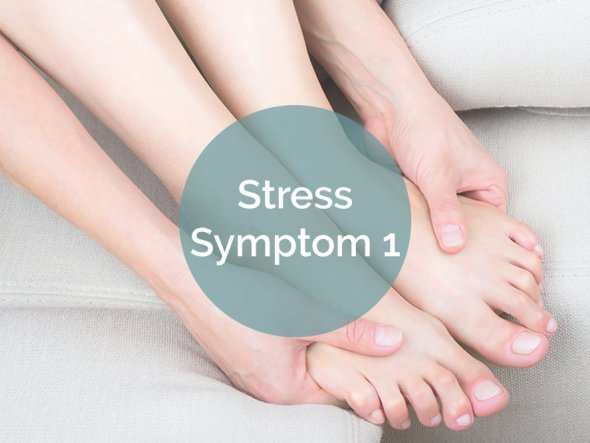
Dry Skin
Stressed out people tend not to drink enough water and instead rely on caffeinated beverages like coffee and soda to get them through the day. This can lead to dehydration that affects the skin all over your body, including your feet.
Foot Fix: If your tootsies resemble the Sahara, replenish their moisture with a nourishing foot soak followed up by slathering both feet in super thick foot lotion and covering with cotton socks for at least a few hours.
Overall Fix: Make sure you drink at least 8 glasses of water each day and try to fill your diet with nutritious foods that also help dehydration (fruits and veggies like tomatoes, cucumbers and celery).
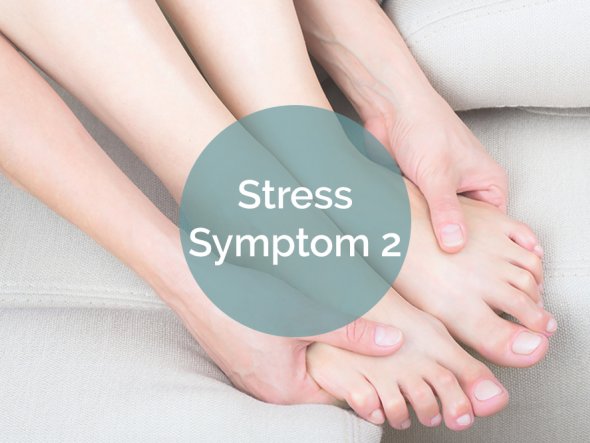
Acne, Eczema or Psoriasis Breakouts
RELATED ARTICLES:
Stress can cause all kinds of skin flare ups, from extra acne to increased issues with eczema and psoriasis. The reason: Stress can disrupt the balance of good and bad bacteria in your gut and can also cause your body to produce cortisol, which whacks out your hormone levels.
Foot Fix: If you’re experiencing foot acne, try some soothing foot soaks in addition to over-the-counter pimple medication. Eczema flare ups can be soothed with hydrocortisone cream, antihistamines, prescription strength ointment and using a humidifier to help moisturize the foot skin. Psoriasis flare ups can be reduced with the application of aloe vera and lotion.
Overall Fix: Outside of managing stress, the best way to help reduce skin flare ups is by eating a healthy diet rich in nourishing fruits and vegetables, reducing alcohol and sugar intake, getting enough sleep, and drinking lots of water. Deep breathing exercises and meditating are also proven ways to reduce stress and skin issues.
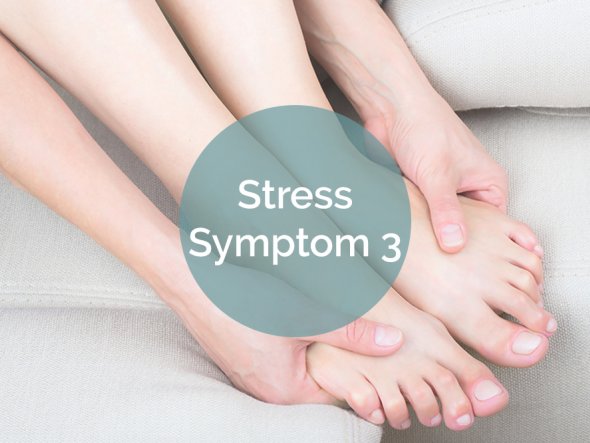
Sweaty Feet
It’s no secret that stress and anxiety create a person to sweat more than usual, and this includes an increased level of foot sweat (called hyperhidrosis in the medical world). The extra moisture is bad enough itself, but it also provides a perfect environment for fungal infections like Athlete’s foot and toenail fungus, as well as creates slippage inside shoes that may lead to blisters and corns.
Foot Fix: One of the best ways to reduce foot sweat is by soaking your feet in astringent footbaths that help reduce pore size. You can also apply antiperspirant to your feet, as well as moisture-controlling foot powder.
If you develop Athlete’s foot or toenail fungus, click here and here for treatment options that can help you get rid of the infections.
Overall Fix: In addition to switching to a higher-strength antiperspirant, you can help reduce bodily sweat by drinking plenty of water, eating healthy foods like whole grains and vegetables, avoiding clothing and shoes made out of non-breathable, man-made materials, and bathing regularly.
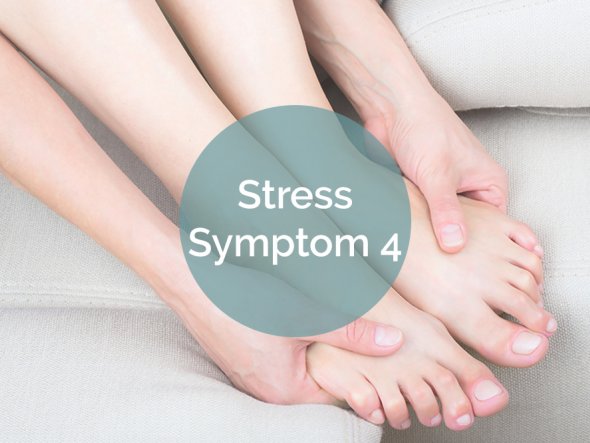
Deep Lines On Your Nails
Most people have vertical lines on their fingernails and toenails, which are usually harmless and due to aging and/or a lack of certain vitamins. However, stress has the ability to cause deep horizontal lines on your nails called Beau’s lines. The condition itself is harmless, but it can signify you’re either overly stressed or have a serious underlying medical condition.
Foot Fix: If you’re experiencing Beau’s lines on your fingernails or toenails, don’t panic about it being permanent. The lines appear when the body stops producing nail cells for a short amount of time, and they will eventually grow out as the nail grows.
Overall Fix: Beau’s lines can develop due to stress, but the condition may also be a sign of a more serious underlying health condition. Therefore, anyone with Beau’s lines or any other type of horizontal lines on their fingernails or toenails is advised to visit a health professional for a full checkup.
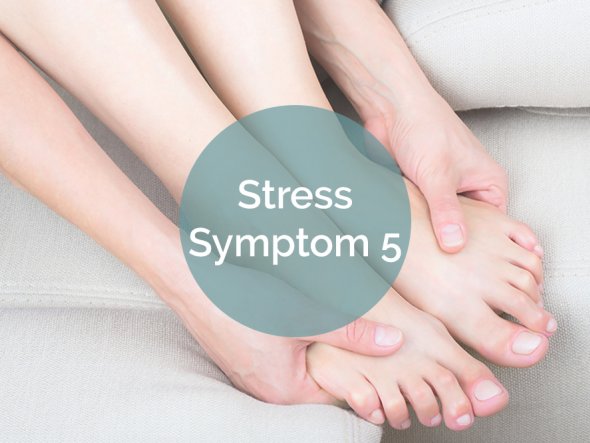
Redness, Swelling and Weakness
Stress can cause redness and swelling in all parts of the body, especially the face. But redness and swelling of the feet can also occur, partially due to the inactive lifestyle most stressed people live, and partially due to changes in blood flow that anxiety and extra adrenaline can produce.
Foot Fix: Joint flexibility, strength and muscle tone all decrease in the feet when a person isn’t active, so try a few foot exercises like these to help strengthen the feet and boost circulation — both of which can help reduce redness and swelling.
Overall Fix: Outside of reducing stress with breathing exercises, mediation and other methods, people who are experiencing redness and swelling due to stress should engage in light, low-impact exercise like swimming, eat a healthy diet full of fruits and vegetables and drink plenty of water.
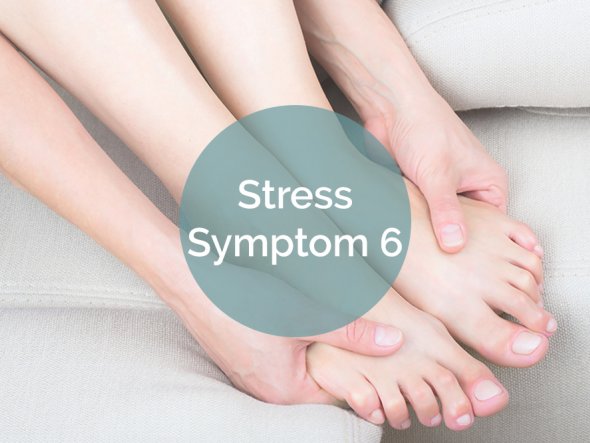
Cold Feet
There are many causes of cold feet, and stress is one of the most common. It affects the body by secreting hormones into your bloodstream that have the ability to activate your “fight or flight” response — which draws blood away from your extremities and pumps it into other areas like your brain and lungs.
YOU MAY ALSO LIKE:
Foot Fix: Having cold feet and hands is generally harmless, and the sensation usually lasts about 20 minutes after an initial stressor causes it. You can speed up the “rewarming” process by deep breathing, which helps calm your body and return blood flow to normal.
Overall Fix: In addition to breathing exercises and reducing stress, anyone who frequently experiences cold hands and feet should visit a health professional. In rare cases, the sensation could be caused by an underlying condition such as poor circulation or Raynaud’s phenomenon.
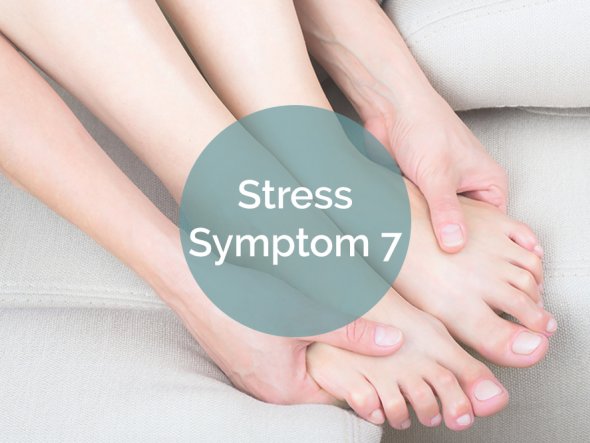
Numb Or Tingly Feet
Strange as it sounds, stress can create sensations of numbness and/or tingling in the hands and feet. The reason is that hyperventilation, anxiety and adrenaline all cause blood to flow away from your feet, which can result in a “my foot fell asleep” pins and needles feeling.
RELATED ARTICLE:
Foot Fix: One of the quickest ways to shake off a numb or tingly feeling in the feet is by moving and rubbing the affected foot. You can also try soaking your feet in Epsom salt footbaths, which help relax the muscles and boost circulation.
Overall Fix: Anyone who experiences frequent numbness or tingling in his or her feet should not assume stress is the cause, as foot numbness and tingling is also a sign of diabetes. If your feet or hands are often numb or tingly, you should visit a doctor to rule out causes that could be much more serious than stress.
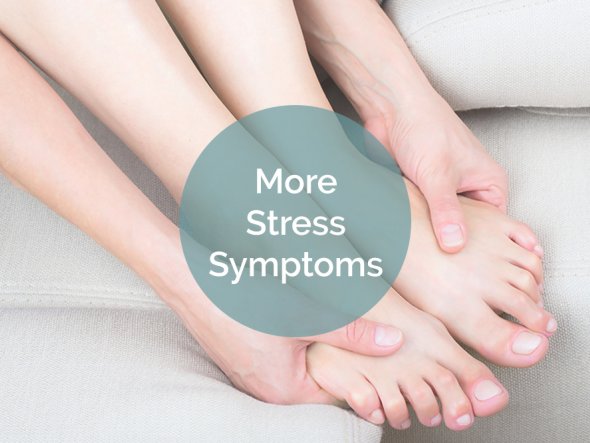
Additional Symptoms Of Stress
While signs of stress show up on your feet, stress has the ability to affect your body in numerous other ways, as well. According to WebMD, some additional signs of stress include:
- Low energy
- Headaches
- Aches, pains and muscle cramps
- Frequent colds and infections
- Upset stomach (including diarrhea, constipation and nausea)
- Insomnia
- Chest pain and rapid heartbeat
- Nervousness and shaking
- Dry mouth and difficulty swallowing
- Clenched jaw and grinding teeth
- Loss of sexual appetite
- Forgetfulness
- Constant worrying
- Inability to focus
Stress is a normal part of life and cannot be wholly avoided. However, there are many steps a person can take to reduce stress levels in their life. These include getting enough sleep, eating a healthy diet, drinking plenty of water, staying active and engaging in relaxation techniques like deep breathing, meditation and massage.
Notice concerning medical entries:
Articles having medical content shall serve exclusively for the purpose of general information. Such articles are not suitable for any (self-) diagnosis and treatment of individual illnesses and medical indications. In particular, they cannot substitute for the examination, advice, or treatment by a licensed physician or pharmacist. No replies to any individual questions shall be effected through the articles.


